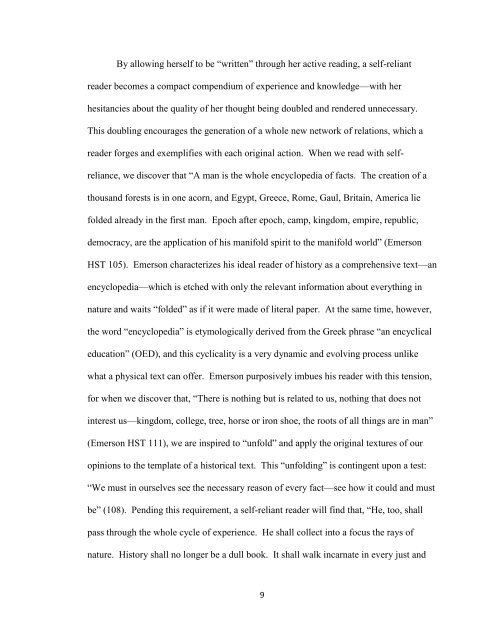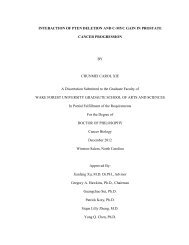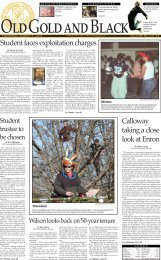RALPH WALDO EMERSON AND THE EVER-EVOLVING ART OF ...
RALPH WALDO EMERSON AND THE EVER-EVOLVING ART OF ...
RALPH WALDO EMERSON AND THE EVER-EVOLVING ART OF ...
You also want an ePaper? Increase the reach of your titles
YUMPU automatically turns print PDFs into web optimized ePapers that Google loves.
By allowing herself to be “written” through her active reading, a self-reliant<br />
reader becomes a compact compendium of experience and knowledge—with her<br />
hesitancies about the quality of her thought being doubled and rendered unnecessary.<br />
This doubling encourages the generation of a whole new network of relations, which a<br />
reader forges and exemplifies with each original action. When we read with self-<br />
reliance, we discover that “A man is the whole encyclopedia of facts. The creation of a<br />
thousand forests is in one acorn, and Egypt, Greece, Rome, Gaul, Britain, America lie<br />
folded already in the first man. Epoch after epoch, camp, kingdom, empire, republic,<br />
democracy, are the application of his manifold spirit to the manifold world” (Emerson<br />
HST 105). Emerson characterizes his ideal reader of history as a comprehensive text—an<br />
encyclopedia—which is etched with only the relevant information about everything in<br />
nature and waits “folded” as if it were made of literal paper. At the same time, however,<br />
the word “encyclopedia” is etymologically derived from the Greek phrase “an encyclical<br />
education” (OED), and this cyclicality is a very dynamic and evolving process unlike<br />
what a physical text can offer. Emerson purposively imbues his reader with this tension,<br />
for when we discover that, “There is nothing but is related to us, nothing that does not<br />
interest us—kingdom, college, tree, horse or iron shoe, the roots of all things are in man”<br />
(Emerson HST 111), we are inspired to “unfold” and apply the original textures of our<br />
opinions to the template of a historical text. This “unfolding” is contingent upon a test:<br />
“We must in ourselves see the necessary reason of every fact—see how it could and must<br />
be” (108). Pending this requirement, a self-reliant reader will find that, “He, too, shall<br />
pass through the whole cycle of experience. He shall collect into a focus the rays of<br />
nature. History shall no longer be a dull book. It shall walk incarnate in every just and<br />
9




